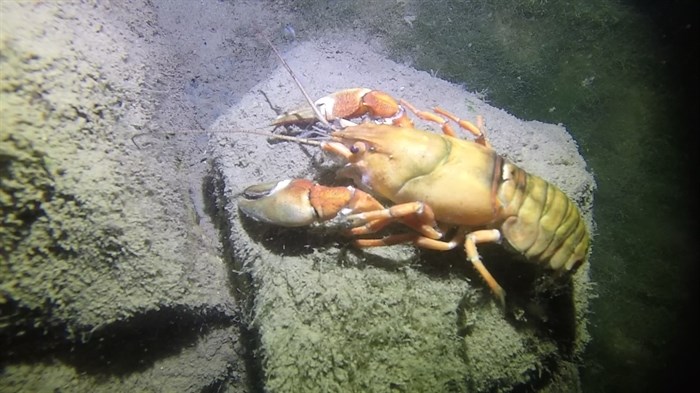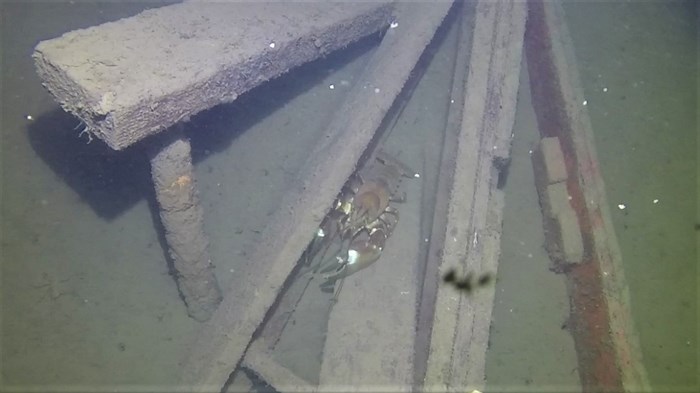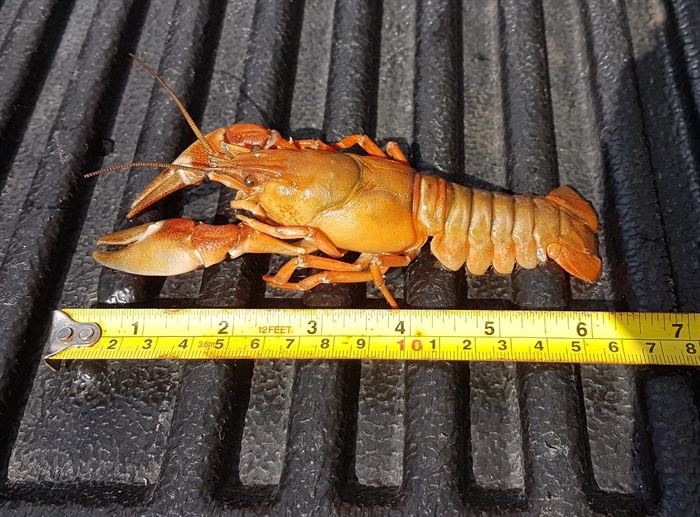
Kevin Aschhoff saw this 10-12 inch long signal crayfish during a night dive in Okanagan Lake.
Image Credit: SUBMITTED: Oceantec Scuba
September 30, 2020 - 12:00 PM
Having been scuba diving more than 2,000 times in Okanagan Lake, professional diver Kevin Aschhoff was rather surprised to discover something he'd never seen before.
Crawling along the edge of a boat wreck 30-feet below the surface of the water was an Okanagan crayfish four times the usual size for this species, measuring roughly a foot in length.
Native Okanagan signal crayfish generally grow to about three inches in length, so Aschhoff's discovery during a night dive last September has surprised experts who did not know the crayfish could grow to such sizes.
"(The crayfish) is the size of a lobster and way, way larger than any known crayfish in the Okanagan," Institute for Underwater Research founder Raphael Nowak told iNFOnews.ca. "It's a very interesting phenomenon."
Nowak, who has been studying Okanagan Lake for 15 years and published a book about the lake, said he's never come across reports of signal crayfish reaching anywhere near this size.
"The typical mature size for one of these creatures is three to four inches," he said. "It's very rare, extremely rare."

Signal crayfish at a wreck during a night dive in September 2019..
Image Credit: SUBMITTED: Oceantec Scuba
Oceola Fish & Game Club president Nick Kozub previously told iNFOnews.ca after years of trapping signal crayfish the largest he'd caught was five to six inches.
West Kelowna resident Justin Rogers runs the Crayfishin' B.C. Facebook page and has been an avid crayfisher for two years but has never seen one bigger than four inches. The largest crayfish any of the few thousand members of his Facebook group has seen was approximately seven inches.
And it's not just those catching crayfish for sport - and snacks - that have yet to come across such giant specimens.
UBC Okanagan professor of biology and environmental science Ian Walker said the crayfish was bigger than anything he'd ever seen.
Aschhoff, who owns Oceantec Scuba in Penticton, said he first saw a dead crayfish about six inches long during the September night dive. He then moved to another wreck and stumbled across a larger crayfish roughly 10 to 12 inches in length. Over the course of the dive, he then saw two more very large live crayfish.
"I came out of the dive and I'm ecstatic," he said.
Aschhoff said he's completed around 2,000 dives in various areas of Okanagan Lake over the last 14 years and has never seen a crayfish before. As the crustacean tend to live in rocky areas, they are usually found closer to shore.
After years of research, Nowak said Aschhoff's report of a large crayfish was the second he'd received in a matter of months.
The freshwater researcher said a local pile driving company had seen a large crayfish while retrieving a sunken boat near Summerland.
"These people have worked on the lake for decades and they have never seen something like it," Nowak said. "They figured it was some plastic toy and when he reached down to retrieve it, it started to move."
Nowak said the sightings affirm that there is so much still not known about the lake.
"It definitely keeps my curiosity going," Nowak said. "While it may be a fairly well-studied lake, it maybe hasn't been a fully understood or well-explored lake yet."

A dead signal crayfish discovered on the bottom of Okanagan Lake.
Image Credit: SUBMITTED: Oceantec Scuba
It's very difficult to know how old the massive crayfish are, or how often they grow to such large sizes.
The researcher said he identified the crayfish as the native signal species by sight and does not believe they are a different species introduced into the lake. But Nowak also acknowledges scientists often need genetic tests to differentiate species.
The sighting of the foot-long signal crayfish raises a lot of questions for scientists to ponder.
Aschhoff said he saw the massive crayfish on a night dive, during a thunderstorm. Ordinarily, he would not go diving during a thunderstorm. He went back to the same spot two days later and the crayfish were nowhere to be seen. He has yet to see them again.
The discovery of the massive crayfish has certainly piqued the curiosity of those involved.
"That's one of the things that keeps me diving is always the possibility to see something new and unknown," Aschhoff said. "It's sort of our last frontier on earth that's unexplored."
To contact a reporter for this story, email Ben Bulmer or call (250) 309-5230 or email the editor. You can also submit photos, videos or news tips to the newsroom and be entered to win a monthly prize draw.
We welcome your comments and opinions on our stories but play nice. We won't censor or delete comments unless they contain off-topic statements or links, unnecessary vulgarity, false facts, spam or obviously fake profiles. If you have any concerns about what you see in comments, email the editor in the link above.
News from © iNFOnews, 2020